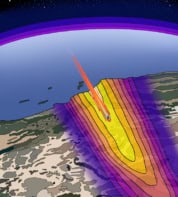
Developing countries must lead research into solar geoengineering and not rely on studies being carried out in Europe and North America. That is the view of 12 prominent scientists who argue that the “global south” is most vulnerable to climate change and has the most to gain or lose from geoengineering. These countries should therefore drive efforts to understand the technology and discussions around its use.
Geoengineering through solar radiation management (SRM) involves cooling the Earth by reflecting away sunlight. Most research focuses on either putting reflective particles into the atmosphere or brightening clouds. Writing in Nature, the authors, including environmental physicist Paulo Artaxo from the University of São Paulo in Brazil, acknowledge that SRM is “outlandish and unsettling”. Yet solar engineering, they say, could counter some effects of climate change by slowing or stopping global temperature rises, if it can be realized.
One of the most important things about solar geoengineering is going to be who makes decisions about it and how
Andy Parker, project director of the Solar Radiation Management Governance Initiative
As well as warning that the environmental effects of SRM are not yet known – “it could,” they say, “be very helpful or very harmful” – the scientists state that this inherently global technology also raises difficult socio-political issues. Local scientific expertise is therefore vital to ensure that regional impact models are accurate. “If universities in the world’s advanced economies continue to lead on research then they will streak away in terms of community knowledge of the potential impacts of solar geoengineering, they might then be the ones lead on the policy side,” co-author Andy Parker, who is project director of the SRM Governance Initiative (SRMGI), told Physics World.
Supporting collaborations
To help finance more regional research, SRMGI has launched a $400,000 fund. Scientists in the developing world can apply for funds to model solar-geoengineering impacts in their regions. The fund will also support international collaborations and researchers will be encouraged to run local workshops to promote wider discussion. SRMGI was launched in 2010 by the UK’s Royal Society, The World Academy of Sciences (TWAS) in Italy and the Environmental Defense Fund in the US. The new fund is administered by TWAS and financed by the Open Philanthropy Project, a foundation backed by Facebook co-founder Dustin Moskovitz and his wife, Cari Tuna.
Engineering the climate
The Nature article also calls for research funders in advanced economies to finance collaborations with scientists in developing countries. The authors state that further outreach and research in the developing world will require extra support from governments, universities and civil society worldwide. Although the scientists say that they are neutral on whether solar geoengineering should ever be used, they do, however, “oppose its deployment until research into its safety and effectiveness has been completed and international-governance mechanisms established”.
“One of the most important things about solar geoengineering is going to be who makes decisions about it and how,” says Parker. “An equitable global conversation increases the chances that those decision will be made well.”




